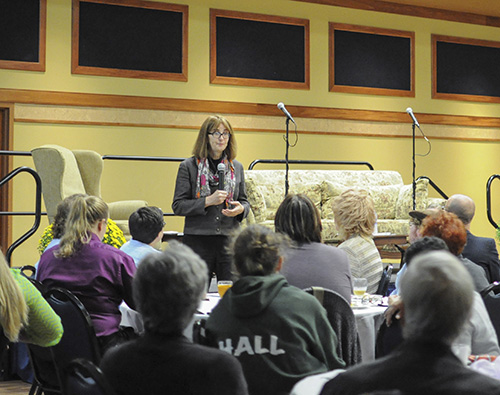
LGBT advocate, Mara Keilsling, answers questions from the audience regarding transgender equality Tuesday evening.
Murray State is making great advances toward LGBT equality, said Jody Cofer Randall, LBGT program event coordinator, but it is by no means finished.
When Cofer Randall invited Mara Keisling, LGBT advocate, to Murray, he knew that heads would be turned. At the third annual Conversation and Dessert Tuesday night, Keisling spoke about her experiences with LGBT communities across the nation and the future of LGBT equality.
After advocating for change in large cities such as Washington D.C. and Atlanta, one would think that LGBT progress in Murray, a small town in the Bible Belt, would not compare. However, Keisling said that many universities are on the same page as Murray State.
“It’s certainly not at the forefront, but it’s definitely not at the rear,” Keisling said. “Of all the thousands and thousands of schools in the country, there’s less than 1,000 that have LGBT resource centers, so I think that’s really super good.”
Cofer Randall and his team have implemented several new programs to get Murray State’s campus up to snuff in terms of equality, particularly with the LGBT resource center.
“The kind of programming the LGBT resource center has been doing and it’s really pretty amazing for a school this size to care that much,” Keisling said.
With President Bob Davies now in the picture, Keisling said she believes he will ultimately help the Murray State LGBT movement become prevalent on campus.
“I think with Dr. Davies being so new you have to hope for the best,” Keisling said. “Hopefully that’s a good sign of further progress. These days, it usually is. Every new person in charge is more LGBT-friendly than the last one.”
Because Keisling grew up in a traditional family during a time before the LGBT movement began, she witnessed a lot of discrimination, which led her to becoming and LGBT advocate, she said.
“I’ve always been kind of a socially-privileged person,” Keisling said. “I grew up middle class. I grew up white. I grew up without a disability. I have been really really fortunate, and when I came out as transgender, I looked around, and I just saw a lot of people who weren’t as lucky as I was.”
For more than 25 years, Keisling has been at the forefront of the LGBT movement. She has spoken to countless universities and colleges across the nation, held meetings with congress and offered education and law reform to other officials in D.C. and nationally.
Keisling said what’s “hot” at the White House right now is healthcare and immigration rights, both of which directly affect transgender people.
“For decades, the kind of healthcare that we need has been denied by most insurance companies,” Keisling said. “As healthcare is changing, we need to make sure that transgender people are taken into consideration.”
Keisling also spoke about the future of young people and the effect their voices have on the future of LGBT equality.
“Most of the big advances in the history of the world have not come from 70-year-olds they’ve come from 20-year-olds and 19-year-olds,” Keisling said.
College and high school students will be the future of not only the LGBT movement, but other equal rights movements as well. Keisling said that immigration rights, racism, sexism and poverty are still big issues in the world, and young people are the people who will change that for the better.
After an audience member asked the one thing was that people need to understand about transgender people, she responded, “I want people to understand this one simple thing about trans-people: we are human.”
Keisling said that transgender people are often falsely labeled and pushed into a category of “those people.” She advocates for LGBT rights everyday with the hope of breaking down stereotypes, removing social barriers and making people understand the facts about LGBT people.
“Everything you ever heard or read about transgender people is probably nonsense,” Keisling said. “Go meet one. Take one to lunch. These are extraordinary people.”
Story by Madison Wepfer, Staff writer



























































































